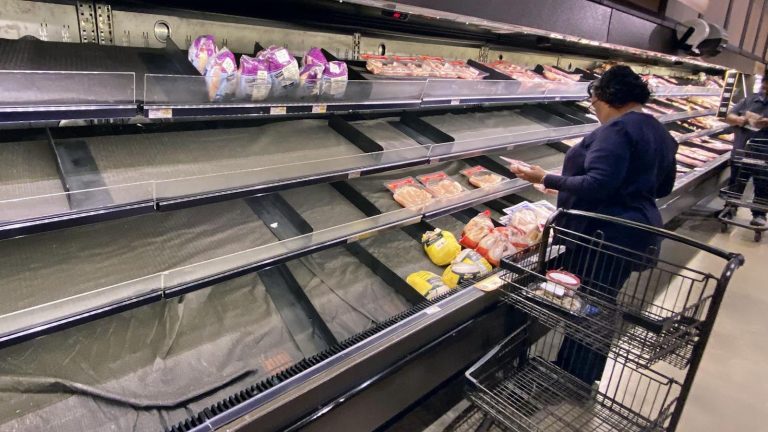Recently I’ve taken work at a grocery store as a stocking clerk. In the process I have gained a little first-hand experience with our poor, sick supply chain, and the practice of just-in-time inventory. Three to four days every week trucks come in, and my compatriots and I fill the blank spots on the walls of food as quickly as we are able. Meanwhile, shoppers come in and make new holes even as we work. It reminds me of building a sandcastle while the tide comes in. Sometimes a few days pass between my shifts, and when I get back, the shelves have developed bare patches again.
We are all getting used to the strange and unsettling appearance of bare store shelves. After all, we have been taking steps to “flatten the curve” since March of 2020, and have been very successful in our efforts—except the curve we are talking about is our GDP. Still, some people are not willing to accept higher prices and food shortages without complaint, even though such things are apparently the goal our illustrious government leaders have in mind.
For example, on a particular day last week, we had two regional management types visiting our little store. While they were speaking to my own store’s general manager, I happened to be standing nearby stocking shelves, when a customer came up to me and pointed to them.
“Are those some kind of big wigs for [the company]?” he asked.
I told him that they were regional management.
“I’m going to ask them why meat is so damned expensive.”
“You can do that” I said, “but I don’t know if they’ll have a good answer for you.”
He did ask. It turns out they had not one good answer, but three. I thought you might be curious what grocery managers are thinking about why food prices—specifically meat prices—are going up, and why supplies are so short. (The conversation is paraphrased for brevity.)
- “Food from overseas is delayed so long in our ports that it rots on the dock. Meat products, fresh fruits and vegetables, and any other perishable foodstuffs are affected by this. Our ports have become a bottleneck.”
“But the meat here is all from the U.S., so that shouldn’t make a difference!” the man protested.
Anyone who has been exposed to basic economics could have told him that a lack of foreign supply can and does directly influence prices at home, even for products made and consumed within the same state. Less supply from overseas means that local production has to cover all of the domestic demand, which means that unless and until the local supply increases dramatically, prices will rise. Ideally, the rising prices will lead other producers to enter the market, but that takes time, especially when we’re talking about animals that have to grow for a while before they can be processed. However, the regional management didn’t take the time to explain any of this to the customer, preferring instead to jump right into the next answer.
- “Domestic meat production has been slowed and handicapped by social distancing restrictions. Before, meat processors had employees standing shoulder to shoulder on a line. Now those same employees have to stand six feet apart. This means, roughly speaking, that only two out of three employees have space to work.”
At this point, we are all aware of the concept of “social distancing.” Many of us regularly ignore the little plastic stickers on the ground or patronizing posters on the wall that businesses put up, telling us to avoid other disease carriers—I mean, other people. Yet food processors who are already under constant scrutiny have less leeway in this regard. Not only are food processors more likely to be compelled to comply with dystopian social distancing requirements, but they are also required to close down operations if they have an outbreak of “THE VIRUS™”. All of this works together to artificially limit supply. When supply can’t keep up with demand, prices will rise.
However, the customer was not yet satisfied. “That’s just an excuse,” he said. “Companies are just taking advantage of the situation to charge what they want.”
At this point, I could almost see the specter of AOC like the sorceress queen from Willow, giggling and screaming: “Price gougers! You’re all PRICE GOUGERS!” However, unlike the soldiers of Willow’s army who were caught unprepared and transformed into swine, these three grocers, with the power of working men who know their jobs, simply held up reason number three, and blocked the attack.
- “Employees are expecting around $15 an hour even for unskilled positions. Businesses have to make a profit, or they fail, so the money to pay employees has to come from somewhere.”
In other words, every burger we eat has a percentage of the salary of the entire supply chain inside it.
What they didn’t say is that it is government entitlement programs and government bailouts that have given workers the ability to be so choosy about the work they will take.
They also didn’t say that the $15 an hour minimum wage is promoted by the same slippery socialists who like to blame retailers for high prices. Like stage magicians, they focus their audience’s attention on wages, and disguise the fact that wages and prices are just two ends of the same stick. When wages rise, prices must necessarily rise to cover them. By bamboozling their audience, however, the socialist wage inflators can be praised for their “generosity” while retailers are blamed for their “greed.” Neat trick, huh?
In the end, the customer seemed to feel like his grievance had been heard. He hadn’t really absorbed their explanations; his underlying belief in the wrongness of high meat prices remained intact. However, he was willing to admit that these three particular grocers clearly were part of the solution, not part of the problem. Their frank and honest manner seemed to sway him more than their words could. For me, however, I loved overhearing their simple explanations of the relationship of supply, demand, wages, and prices, based not on theory but on their practical, daily experience.
At the end of the day, reality always asserts itself. If we are surprised by the result, the fault lies in our inability to see things as they really are. Political theories are especially prone to this kind of selective blindness, because they are primarily based on what makes a speaker look good in the moment. Grocery store managers, truck drivers, and professionals and small business owners in general have a stricter standard. Though they are no less prone to human error, they are more exposed to the stinging bite of reality. When the ports shut down and suppliers come up empty, they are the ones held accountable for the empty shelves.














The first two words you will hear as a catch-all to all this:
“record profits”
You’ll find the “evidence” everywhere. and it’s their default.
I hear you. The evidence of “record profits” makes businesses seem greedy–especially if you forget (as socialists like to do) that those “profits” are puffed up because so much funny money got wired into people’s bank accounts.
I think it shows how strongly we want to believe that money holds a constant value, that even when we know it is being inflated, we still use it to compare the relative performance of the market from year to year.
This is where you start to lose people
“””
What they didn’t say is that it is government entitlement programs and government bailouts that have given workers the ability to be so choosy about the work they will take.
“””
A society that values putting people into desperate situations where they have to accept a poverty wage isn’t something to aspire to.
You’re right, and I phrased that poorly. I made the mistake of giving credit to entitlement programs for providing people with greater choice, which is generally a positive thing. In reality, entitlement programs create a perverse incentive where people often stand to make less money by working, and therefore choose to be unproductive, which hurts them and hurts everybody else.
The main point I was trying to make here is that every measure the government takes to raise up the minimum wage and bail people out has the effect of raising the cost of basic goods and services, because businesses then have to raise wages to compete with the government’s working disincentive, and wages are a percentage of the cost of every good or service sold. It’s like a dog chasing its tail. Yes, in the short term, it looks like that dog is really going somewhere, but he’s just spinning in circles. Wherever he goes, his tail follows.
I tried to make that point more clearly in the next paragraph: government bailouts, minimum wage, and other such programs are like an illusion that makes it look like wages and prices are somehow separate. As if we, the customers, weren’t actually the ones paying all the wages all along by the cost of our purchases.
Anyway, thanks for the feedback. I hope you can look past my error to see my intent, which is to show that when it comes to food prices, your average grocery store manager sees what is happening much more clearly than any number of Ivy League graduates with a political axe to grind.